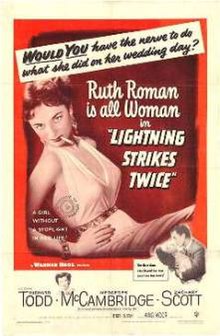Lightning Strikes Twice (1951 film)
| Lightning Strikes Twice | |
|---|---|
 Theatrical release poster | |
| Directed by | King Vidor |
| Screenplay by | Lenore J. Coffee |
| Based on | A Man Without Friends 1940 novel by Margaret Echard |
| Produced by | Henry Blanke |
| Starring | Richard Todd Ruth Roman Mercedes McCambridge |
| Cinematography | Sidney Hickox |
| Edited by | Thomas Reilly |
| Music by | Max Steiner |
Production company | |
Release date |
|
Running time | 91 min. |
| Country | United States |
| Language | English |
| Budget | $1,108,000[1] |
| Box office | $1,144,000[1] |
Lightning Strikes Twice is a 1951 American drama film starring Ruth Roman and Richard Todd.[2] In February 2020, the film was shown at the 70th Berlin International Film Festival, as part of a retrospective dedicated to King Vidor's career.[3]
Plot[]
Once a rancher, Richard Trevelyan (Richard Todd) is now on a Texas prison's death row. But he wins a new trial, then a complete acquittal when a lone juror holds out.
Actress Shelley Carnes (Ruth Roman) is on her way to a Texas dude ranch for a rest. Along the way, she meets ranchers J.D. (Frank Conroy) and Myra Nolan (Kathryn Givney) and ends up borrowing their car. Lost in a storm, she encounters Trevelyan by chance. It turns out he knows J.D. and Myra.
The dude ranch is closed when Shelley gets there. Liza McStringer (Mercedes McCambridge), who runs it with a younger brother nicknamed String (Darryl Hickman), explains that she was the juror who let Trevelyan go free. And now she's being shunned by neighbors and friends.
Shelley bonds with the troubled String, so she is invited to stay a while. She learns that Loraine, the late wife of Trevelyan and murder victim, was a rather wicked woman, loathed by many. There is reason to believe Loraine once had an affair with J.D.
Returning the car, Shelley spends a night with the Nolans and is introduced to Harvey Turner (Zachary Scott), a neighbor who is immediately attracted to her. Harvey, too, speaks ill of the late Loraine and describes himself as lucky to have escaped her clutches.
Shelley again meets Trevelyan and the two cannot resist each other. They marry, but on their wedding day Shelley discovers something that makes her think Trevelyan murdered Loraine after all. She flees. It turns out, however, that Liza, jealous and wanting Trevelyan, was the one who murdered Loraine. Now she nearly does likewise to Shelley, but Trevelyan and the police rescue her. Liza and String flee in their car, but take a fatal plunge over a cliff; Shelley and Trevelyan embrace at the scene and drive off to live happily ever after.
Cast[]
- Ruth Roman as Shelley Carnes
- Richard Todd as Richard Trevelyan
- Mercedes McCambridge as Liza McStringer
- Zachary Scott as Harvey Turner
- Frank Conroy as J. D. Nolan
- Kathryn Givney as Myra Nolan
- Rhys Williams as Father Paul
- Darryl Hickman as String
- Nacho Galindo as Pedro
- Joaquin Garay as Johnny López (uncredited)
- Franklin Parker as Guard (uncredited)
- Frank Cady as Gas Station Man (uncredited)
Production[]
Warner Bros had owned the rights to the book since 1945.[4]
Virginia Mayo was originally cast in the female lead.[5]
The music score repeatedly echoes a passage from La valse by Maurice Ravel.
Reception[]
Box office[]
According to Warner Bros records, the film earned $785,000 domestically and $359,000 internationally, meaning it earned $1,144,000 all up.[1]
Critical response[]
Film critic Glenn Erickson discussed the director's film style in his review:
As the 1950s rolled in director King Vidor's brilliant but eccentric pictures became much more eccentric than brilliant. The Fountainhead and Ruby Gentry break down into interesting patterns of dynamic visuals, even as their overheated dramatics are impossible to take seriously. 1951's Lightning Strikes Twice forms a link between King Vidor and Douglas Sirk's delirious women's pictures. Faced with a gimmicky, far-fetched storyline and inconsistent characters, Vidor still manages to make the movie highly watchable, even enjoyable ... But get ready to smile at the overcooked, sometimes hysterical acting and the big fuss made over a fairly simple mystery ... the picture is a camp hoot from one end to the other.[6]
References[]
- ^ a b c Warner Bros financial information in The William Shaefer Ledger. See Appendix 1, Historical Journal of Film, Radio and Television, (1995) 15:sup1, 1-31 p 31 DOI: 10.1080/01439689508604551
- ^ Lightning Strikes Twice at the American Film Institute Catalog.
- ^ "Berlinale 2020: Retrospective "King Vidor"". Berlinale. Retrieved 28 February 2020.
- ^ THOMAS F BRADY (Dec 19, 1949). "RICHARD TODD SET FOR WARNERS LEAD". New York Times. ProQuest 105829321.
- ^ "Film Facts and Fanfare". The Mirror. Perth. 11 February 1950. p. 14. Retrieved August 10, 2013 – via National Library of Australia.
- ^ Erickson, Glenn. DVD Savant, film/DVD review, October 9, 2009. Accessed: August 10, 2013.
External links[]
- Lightning Strikes Twice at the American Film Institute Catalog
- Lightning Strikes Twice at IMDb
- Lightning Strikes Twice at AllMovie
- Lightning Strikes Twice at the TCM Movie Database
- Lightning Strikes Twice information site and DVD review at DVD Beaver (includes images)
- Lightning Strikes Twice film scene on YouTube
- 1951 films
- English-language films
- 1950s thriller drama films
- American black-and-white films
- American films
- American thriller drama films
- Film noir
- Films scored by Max Steiner
- Films based on American novels
- Films set in Texas
- Warner Bros. films
- Films directed by King Vidor
- 1951 drama films